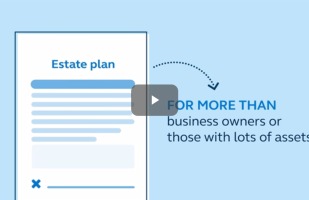
It’s time to have “The [estate planning] Talk”
If you’re the parent of small children, you know there will be a time when you have to have “the talk” with them. This is something that many of us wring our hands about. When’s the right time? How do we eve start the conversation? And of course, geez, this is going to be uncomfortable.
Well, you can now add another “talk” to that list: the one you need to have with your parents about their estate plan. More and more younger people are realizing it’s time to broach this subject with their parents.
Part of this is the natural cycle of life, but the COVID pandemic also forced many people to think about not only their parents’ long-term physical health, but also whether they’re financially prepared for the future.
In fact, research found that the pandemic prompted 45% of 18- to 34-year-olds and 35% of 35- to 54-year-olds to engage in estate planning. However, that urgency was not as high for Americans aged 55 and older, as only 28% of individuals in that cohort engaged in estate planning due to the pandemic.1 This may be due to the fact that some members of this age group have already set up their estate plan (but it’s worth noting that only 33% of Americans overall have a will.2)
The hardest talk
This lack of planning and the financial difficulties it can create is exacerbated by the general difficulty we have talking about finances with family members. A 2019 survey from Lincoln showed that, while 93% of Americans believe it is important to set a plan for their family and their own financial future, 47% struggle to discuss finances with their loved ones.3
Add to that the table-turning discomfort children often feel when they are forced to confront parents who may not have done sufficient financial planning. After all, going to the people who raised you and may have financially supported you for a good portion of your life and saying, “We need to talk about money and end-of-life issues” can bring up all sorts of complicated feelings and previously bottled-up emotions (read: parenting your parents).
If you’re among the many adults who feel powerless when it comes to talking to your parents about their financial situation, I am here to let you know that you have more power than you might think. You also have a right – and often an obligation – to have these conversations.
It may be of some help to know that there’s a good chance your parents are concerned about money issues as well and are likely thinking about how to have these conversations, too. A survey Janus Henderson conducted with the Financial Planning Association in 2019 showed that 44% of parents are somewhat or very concerned with helping their children make better financial decisions and 34% of parents are somewhat or very concerned with communicating about money with their children.4 And let’s not forget the fact that those in the “sandwich generation” are also dealing with the stress of having to take on greater financial (and logistical and emotional) responsibilities associated with caring for their parents as well as their own children.
Clearly, there is stress on both sides of the equation. But I think being aware that their parents are also likely experiencing anxiety should empower younger folks to take the lead in broaching the subject.
How to make the conversation easier
So, how can you feel more comfortable about having “the talk” with your parents?
I think the most non-contentious way to start this conversation is to ask for advice. This allows you to keep the natural hierarchy between yourself and your parents. A possible question might be: “Since we got married, we are thinking about our estate plan. How did you and mom/dad decide who would be your power of attorney and health care proxy?”
Even if they answer by saying that they haven’t made any decisions on this front, you now have the information you need and the opportunity to encourage them to take these important steps.
Another approach is to focus on specific health-related issues that may be part of your family’s history. Whether it’s cancer, heart disease, dementia, or something else, it’s hard for most people to simply shrug off these types of concerns. You might say something like, “You know mom/dad, I’m concerned about your health, and I want to make sure your legal (or financial or medical) documents are in order should something happen.”
Along with the more indirect health-related route, you can also provide direct financial advice by saying, “I read this article the other day that said it’s important for families to talk about estate planning items like a will, health care proxy, and power of attorney. Can we schedule some time to gather up everything you’ve put in place and review things that might need to be updated?”
But what happens if your parents do simply shrug these issues off when confronted about them, either indirectly or directly? What if they say, “It’s none of your business.” This type of response is akin to a financial “Go to your room!”
In my opinion, the best way to respond – respectfully, of course – is with something along the lines of, “Yes, it’s your money, but it could be my business someday. I owe it to you to care for you as best as I can, just like you did when I was growing up.”
Remember that it’s important to be patient with these conversations. They are uncomfortable and they can be complex both financially and emotionally. But they are incredibly important to have, especially when you consider the fact that 70% of estate plans fail, and the majority of those failures are due to a lack of trust and communication.5
Even though it may feel backwards as a child to be bringing these sensitive topics up with your parents, you should feel empowered knowing that you are contributing to your family’s long-term financial stability.
For more information or support to help clients develop their estate plan, explore our wealth transfer resources.
Sources
1 “For the First Time, Caring.com’s Wills Survey Finds that Younger Adults Are More Likely to Have a Will than Middle-Aged Adults.” Caring.com, 2021.
2 Ibid.
3 “Nearly Half of Americans Struggle to Discuss Finances With Loved Ones, Reveals Lincoln Financial Group Research.” Lincoln Financial, 2019.
4 “The War on Stress.” Financial Planning Association and Janus Henderson Investors, 2019.
5 FUSE Research Network and Janus Henderson Retirement Strategy Group, 2015.
The information contained herein is for educational purposes only and should not be construed as financial, legal or tax advice. Circumstances may change over time so it may be appropriate to evaluate strategy with the assistance of a financial professional. Federal and state laws and regulations are complex and subject to change. Laws of a particular state or laws that may be applicable to a particular situation may have an impact on the applicability, accuracy, or completeness of the information provided. Janus Henderson does not have information related to and does not review or verify particular financial or tax situations, and is not liable for use of, or any position taken in reliance on, such information.
The opinions and views expressed are as of the date published and are subject to change. They are for information purposes only and should not be used or construed as an offer to sell, a solicitation of an offer to buy, or a recommendation to buy, sell or hold any security, investment strategy or market sector. No forecasts can be guaranteed. Opinions and examples are meant as an illustration of broader themes, are not an indication of trading intent and may not reflect the views of others in the organization. It is not intended to indicate or imply that any illustration/example mentioned is now or was ever held in any portfolio. Janus Henderson Group plc through its subsidiaries may manage investment products with a financial interest in securities mentioned herein and any comments should not be construed as a reflection on the past or future profitability. There is no guarantee that the information supplied is accurate, complete, or timely, nor are there any warranties with regards to the results obtained from its use. Past performance is no guarantee of future results. Investing involves risk, including the possible loss of principal and fluctuation of value.
Janus Henderson Group plc ©
C-1023-51935 10-30-24 TL



